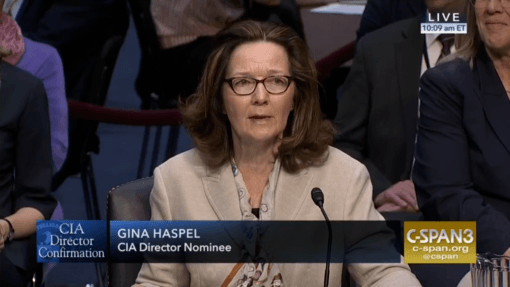
Photograph Source – C-SPAN
Last week, the New York Times did its best to rehabilitate CIA director Gina Haspel, who was one of the agency’s leading proponents and players in the unconscionable policy of torture and abuse in CIA’s secret prisons. Today, the New York Times doubled down on its bet, and ran a letter to the editor from a former operations officer, Douglas Wise, who predictably extolled the virtues of “Bloody Gina.” Whereas the Times’ reporters credited Haspel with the “skills of a spy,” the CIA operative explained that it was “not spycraft (sic); it’s professionalism.” The one thing that the Times and the letter writer have in common is the purveying of bullshit.
The obvious issue concerns their belief that Haspel has genuinely ingratiated herself with the commander-in-chief. Their view is “yes;” my answer is “you must be kidding.” Let’s review the bidding. The CIA believes that Russian hacking took place during the 2015-2016 presidential campaign. The president believes Russian President Vladimir Putin’s denials. The CIA believes that North Korea continues to expand its nuclear weapons program. The president’s love affair with Kim Jong Un has no room for such nuclear activity.
It gets worse. The CIA believes that Saudi Arabia’s Mohammed bin Salman orchestrated the killing of Saudi dissident journalist Jamal Khashoggi. The president has accepted the Saudi denials of the crown prince’s involvement. The CIA has credited Iran with honoring all aspects of the Joint Comprehensive Plan of Action. The president and his secretary of state falsely accuse Iran of violations and have the United States from an important international nuclear agreement. On and on it goes.
The Times and the CIA operative argue that Haspel has created an “effective relationship with the president.” Indeed, the operative calls it “masterful.” In actual fact, the president began a war on the intelligence community, particularly the CIA, before he was even inaugurated. The CIA, after all, was compared to the Gestapo of the Third Reich!
My sources in the intelligence community tell me that the president rarely sits still for CIA intelligence briefings and that he relies on national security adviser John Bolton for such briefings. Bolton, by the way, has a long history of hostility toward the CIA along with a record for politicizing agency assessments in his various posts at the Department of State, the United Nations, and now the National Security Council.
The operative also states Haspel’s “effective relationship” has contributed to “national security decisions.” Au contraire. I cannot cite one example of the president relying on CIA estimates or assessments in his decision making. Surely, his call for withdrawal from Syria had nothing to do with the views of the intelligence community. And what about the abrogation of the Intermediate-range Nuclear Forces Treaty. Can our operative cite any intelligence briefs that are critical of a seminal disarmament treaty that abolished an entire class of nuclear weapons?
The operative also states that Haspel’s credibility with the president is “unmatched by recent directors.” More nonsense. George H.W. Bush and CIA director Robert Gates were tight. Barack Obama and CIA director John Brennan were tighter; the president even ignored Brennan’s violation of the separation of powers when he authorized hacking the computers of the Senate intelligence committee’s staff that was examining CIA’s sadistic policies of torture and abuse.
The Times, meanwhile, inadvertently gave away the real game when it argued that Haspel plays an important role with the president because Donald Trump sees Haspel as an “extension of Mr. (Mike) Pompeo,” her predecessor whose loyalty to the president should have disqualified him in the confirmation process. CIA directors are needed to tell truth to power, and not to provide loyalty. And the press is needed to provide oversight and accountability of our secret intelligence organizations and not to provide space for apologists.